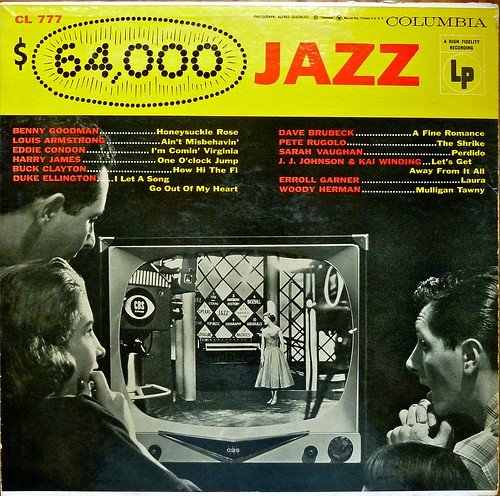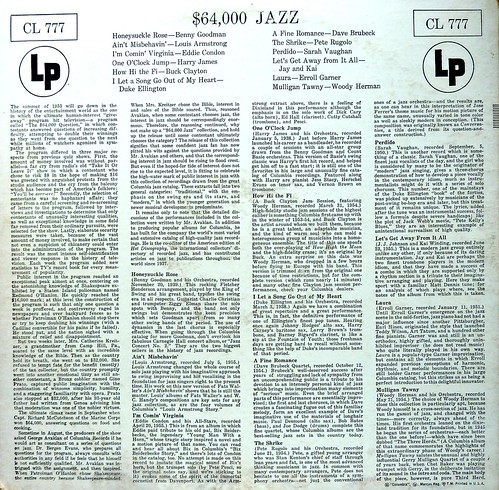
... but this was great. Every damn thing on the album, immensely enjoyable. (You can download it for $7.) I will not attempt to describe this music, because, look, it has extremely extensive liner notes, including an elaborate description of the TV show, which offered the category jazz, an event that has something to do with the assembling of this collection.
If you're curious what, read this:

The track I'm least inclined to like was Erroll Garner cascading all over the piano with "Laura." It's the one track that seems corny, but I still like it. Garner is obviously committed to playing like that, and I see that it was recorded on January 11, 1951, the day before I was born. There's no singing on this album — except for that Sarah Vaughan track and a bit of Louis Armstrong on "Ain't Misbehavin'" — so if you're not familiar with the lyrics to "Laura," your enjoyment of the Garner instrumental might be heightened by listening to one of the beautiful versions of it. Here's Frank Sinatra, and here's Johnny Mathis.
My favorite track was Buck Clayton, "How Hi the Fi." I can't find it on YouTube, but it's only 89¢ to download. [UPDATE: Here is is.] I don't remember ever hearing of Buck Clayton. Wikipedia says:
Buck Clayton (born Wilbur Dorsey Clayton; Parsons, Kansas, November 12, 1911 – New York City, December 8, 1991) was an American jazz trumpet player who was a leading member of Count Basie’s "Old Testament" orchestra and a leader of mainstream-oriented jam session recordings in the 1950s. His principal influence was Louis Armstrong....I wonder what my father would have thought of computers. He loved his HiFi, and built some components using Dynaco kits. I think he would have loved computers and he would have looked up these biographies and clicked through to learn about Li:
From 1934 or 1935 (depending on the sources), he was a leader of the "Harlem Gentlemen" in Shanghai. His experience in the east was unique, since Clayton was discriminated against by fellow American marines who were stationed in Shanghai. On numerous accounts, he was attacked by soldiers, including an instance where bricks were thrown at him. On the contrary he was treated like an elite by the Chinese. Some of the bureaucratic social groups he was with included Chiang Kai-shek's wife Soong Mei-ling and her sister Ai-ling, who were regulars at the Canidrome. Clayton would play a number of songs that were composed by Li Jinhui, while adopting the Chinese music scale into the American scale. Li learned a great deal from the American jazz influence brought over by Clayton. A 1935 guidebook in Shanghai listed Clayton and Teddy Weatherford as the main jazz attraction at the Canidrome. He would eventually leave Shanghai before the 1937 Second Sino-Japanese War. Clayton is credited for helping to close the gap between traditional Chinese music and shidaiqu/mandopop. Li is mostly remembered in China as a casualty of the Cultural Revolution.
Li Jinhui (September 5, 1891 – February 15, 1967) was a composer and songwriter born in Xiangtan, Hunan, China. He is often dubbed as the "Father of Chinese popular music." He created a new musical form with shidaiqu after the fall of the Qing Dynasty-- moving away from established musical forms. Li was a very controversial figure in China. Although his music was extremely popular, the Chinese Nationalist Party attempted to ban his music, and Li was eventually silenced in death as a victim of political persecution in 1967 during the height of the Cultural Revolution....Exactly what happened? It's so sad to think even of the memories that have been lost. Googling, I find this interview with Andrew Jones, author of “Yellow Music: Media Culture and Colonial Modernity in the Chinese Jazz Age”:
Though Li’s early work is completely innocent and educational in content, it still met with disapprobation from some critics despite its immense popularity. This resistance may be due to the manner in which these songs were performed. Beginning in 1923, Li’s broke the taboo of not allowing women to perform on stage when he hired young girls to sing and dance in his school musical productions....
As radio became more widely accessible, so then did Li’s jazz, for which he received vicious criticism as “Yellow (or pornographic) Music.” One 1934 reviewer said of Li that he is “vulgar and depraved beyond the hope of redemption…[but] as popular as ever.” His greatest source of Jazz influence came from American Buck Clayton who worked with Li for two years. Clayton played a major role in shaping the musical scores written by Li. Li’s revolutionary Sinese jazz music dominated the nightlife scene, and it was performed at cabarets, cafes and nightclubs around southeast Asia....
Li continued to compose music the rest of his life, though he would eventually pay dearly for his fame. Classified as a founder of Yellow Music by the Communist Party of China, he became a victim of political persecution during the Cultural Revolution.
Li Jinhui... had a bad reputation. He was supposed to be a bad guy who created the degenerate form of music that was called “yellow music.” “Yellow music” means, basically: pornographic, salacious, off-color music in Chinese. It was a music that had been banned by the Chinese Communist Party. It was a kind of music that was seen as being decadent and colonial and unfit for Chinese ears after 1949, after the revolution.
But what I started to find out about Li Jinhui was actually pretty surprising. He was known as the founder of pop music but, in fact, he began his career as a nationalist and a patriot who was trying to modernize the Chinese language by instituting a new, standard Mandarin to knit together the patchwork of different dialects in China to create a stronger, more unified nation. The way that he hit upon to do this was actually to write operas for children using Chinese folk tunes, western instruments and having scripts for the kids to sing in standard Chinese.....
[T]he young girls that he had trained became the biggest stars in Chinese pop music and on Chinese screens. He, himself, became a very famous song writer and kind of pioneered this new style of modern jazz music, almost against his will or expectations....
In the early ’30s, the ruling Nationalist Party had a movement called the New Life Movement. It was basically a propaganda movement to instill proper virtues and morality in the people. The Nationalist Party at that time wanted to adopt or re-champion Confucian morality as a sort of ideological glue for the nation. So, they wanted to clamp down on Li Jinhui because they saw the music as being decadent. There was a lot of hypocrisy in that and, of course, once you ban something, it just means it does even better in the marketplace.It seems like there should be a movie about Buck Clayton and Li Jinhui. Trying to remember my father, I stumble into their story, and it feels so terribly sad. And I've drifted so far from the starting point. This record has nothing to do with China. My father was always trying to engage me in conversations about anything. I'm sure China was one of his topics, maybe jazz in China, maybe black jazz men in the marines, and how the Chinese treated American black men, and how the Chinese treated their own jazz men. But all those conversations, which he sought so dearly, are eternally unspoken.




5 comments:
Ann,what a great series! And the comments I've read have been delightful. Well, I've got two stacks of 78's sitting on the old hi-fi...you've about got me motivated to trudge throught them!
"Let's Get Away from it All". My theme song. I put it on the cd player everytime I leave town and we all sing the chorus. Classic tune.
First record you posted that my parents did not have too. My dad won a hi-fi in some charity lottery. It was a very nice one, and he built it into cabinets in the living room. It was so cool for the time.
I have the entire Glenn Miller compilation on vinyl, two multi disc editions, one with a cream cover and one with gold. And the original Benny Goodman 1938 Carnegie Hall concert record (not published until the 1950's when a recording of the event was found.)
Both still among my favorite music.
Very nice series of posts.
My father owned this one, too, and it was one of the albums that got me seriously interested in jazz when I was in junior high school.
@terryteachout Cool!
Thanks for commenting here.
Post a Comment
Please use the comments forum to respond to the post. Don't fight with each other. Be substantive... or interesting... or funny. Comments should go up immediately... unless you're commenting on a post older than 2 days. Then you have to wait for us to moderate you through. It's also possible to get shunted into spam by the machine. We try to keep an eye on that and release the miscaught good stuff. We do delete some comments, but not for viewpoint... for bad faith.